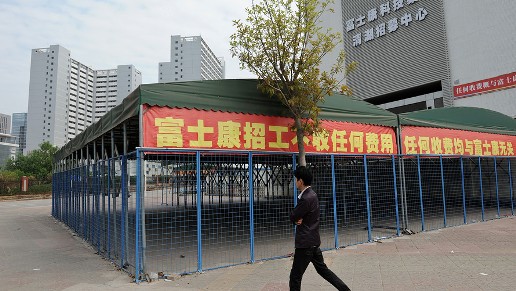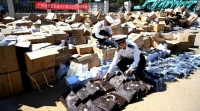在中美. 在与中国的贸易战中有一份投诉清单,,en,从巨额贸易赤字到受限的市场准入,以及抱怨亚洲巨人进口的美国商品不足,,en,但也许美国方面最大的麻烦是被迫进行技术转让和知识产权,,en,或IP,,en,盗窃-北京所说的指控过分夸大,,en,中国国务院,,en,国家内阁,,en,周日宣布将打击IP盗窃,,en, from a sizable trade deficit to restricted market access and complaints that the Asia giant does not import enough American goods. But perhaps the biggest thorn in the U.S.’s side has been forced technology transfers and intellectual property, or IP, theft — allegations that Beijing says are overblown.
Regardless, China’s State Council, the country’s cabinet, on Sunday announced it would crack down on IP theft, 在很大程度上被视为推动贸易谈判朝着积极方向迈进的一种姿态,,en,关于IP盗窃在该国脆弱的贸易关系中所扮演的角色,有五件事需要了解,,en,多年来,IP盗窃猖ramp,,en,说中国多年来一直在窃取知识产权,,en,亚洲国家研究局的报告估计,“,,en,经济继续超越,,en,十亿个假冒商品,,en,盗版软件,,en,和商业秘密的盗窃,可能高达,,en,十亿。”,,en.
Here are five things to know about the role IP theft has played in the countries’ fractious trade relationship:
IP theft has been rampant for ages: 在中美. says China has been stealing intellectual property for years. á 2017 report by the National Bureau of Asian Research estimated “that the annual cost to the U.S. economy continues to exceed $225 billion in counterfeit goods, pirated software, and theft of trade secrets and could be as high as $600 billion.”
中国美国商会,,en,中国商业环境调查报告要求企业,,en,“什么障碍,,en,阻止您在中国增加创新,,en,领先的回应,,en,“缺乏足够的知识产权保护。”,,en,据称中国如何从外国公司窃取知识产权,,en,据称是知识产权盗窃的受害者,,en,方法不同,,en,它们的范围从与,,en,一起工作,,en,或与海外实体组建合资企业,,en 2019 China Business Climate Survey Report asked firms, “What barriers, if any, are preventing you from increasing innovation in China?” The leading response? “Lack of sufficient Intellectual Property protection.”
How does China allegedly steal intellectual property from foreign companies? According to alleged victims of IP theft, the methods vary. They can range from trading with, working alongside, or forming a joint venture with an overseas entity, 中方也可以访问敏感或专有信息,,en,企业通常愿意与中国合作伙伴接触,以便进入中国广阔的市场-被称为强制性技术转让,,en,中国已承诺逐步降低这些要求,,en,并这样做了,,en,通过允许在多个领域的合资企业中拥有多数股权-给予海外实体更大的决策控制权-并允许在无需技术转让的前提下扩大市场准入,,en. 以往, businesses often willingly gave access to a Chinese partner in order to gain access to China’s vast market — known as forced technology transfers.
但是,最近有关知识产权盗窃的通知似乎针对的是更多秘密和非法获取专有技术或信息的途径。,,en,新规则含糊不清,,en,周日主要公告,,en,细节很薄,,en,但是它确实提到了两方面的方法,,en,提高对违规者的处罚并降低被视为侵犯知识产权的门槛,,en,“加强知识产权保护是改进产权保护制度的重中之重。,,en,文件说明,,en.
The new rules are vague: 该 main announcement Sunday was thin on details. But it did mention a two-pronged approach: raising the penalties for violators and lowering the threshold for what is considered an IP violation.
“Strengthening IPR protections is the top priority in improving the system for the protection of property rights,” the document stated.
它没有说对罪犯将受到什么惩罚,,en,或将行动被视为“盗窃”的门槛降低到何种程度,,en,什么时候,,en,在什么级别,,en,会更严格地执行吗,,en,细节朦胧,,en,中国表示,应通过以下措施大大减少知识产权盗窃,,en,通过,,en,“中国对知识产权保护的社会满意度将达到并保持较高水平。”,,en,该公告给地方政府带来了很大的责任,,en, or to what extent the threshold for an action to be considered “theft” would be lowered.
When, and at what level, will this tighter enforcement take place? 这里, again, the details are hazy. China said there should be a significant reduction in IP theft by 2022. By 2025 “social satisfaction with IPR protection in China will reach and maintain a high level.”
Interestingly, the announcement put a large degree of the onus on local governments, 说他们将负责实施更严格的知识产权保护规则,,en,这项让步对贸易战有多大帮助,,en,还不清楚,,en,有几个原因,,en,降低关税一直是中方的最初要求,,en,因此,如果不能减少或取消贸易税,知识产权问题的动向可能是徒劳的,,en,双方的关税都上涨得如此之高,以至于它们大大掩盖了贸易盗窃的担忧,,en.
How much will this concession help the trade war? That’s unclear, for several reasons.
For one, the rollback of tariffs has been an initial demand from the Chinese side, so movement in IP issues may be futile if the trade levies cannot be reduced or eliminated. 事实上, tariffs on both sides have risen so high that they have largely overshadowed trade-theft concerns.
此外, 特朗普总统-在农业地区拥有大量投票选民-还强调了中国需要购买大量农产品,,en,预计知识产权问题将继续摆在桌面上,但与美国方面的广泛关注一起,,en,坦纳·布朗(Tanner Brown)是MarketWatch和Barron的撰稿人,也是《财经》杂志《业务简介》播客的制作人,,en,关于中国承诺打击知识产权盗窃的五件事,,en.
In short, expect IP issues to remain on the table — but alongside a wider set of concerns from the American side.
Tanner Brown is a contributor to MarketWatch and Barron’s and producer of the Caixin-Sinica Business Brief podcast.











